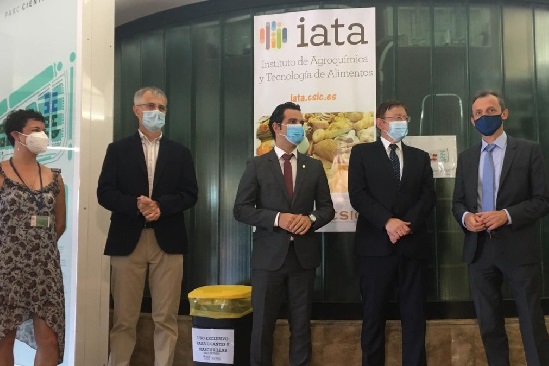
-
The scientists at this CSIC centre in Paterna (Valencia) are actively working on finding solutions to combat the health crisis caused by the coronavirus
-
The detection of viral RNA in wastewater to monitor the presence of the virus or the development of new materials for masks are some of the projects
The Minister of Science and Innovation, Pedro Duque, and the President of the Generalitat Valenciana, Ximo Puig, toured the facilities of the Institute of Agrochemistry and Food Technology (IATA), a centre of the Spanish National Research Council (CSIC) located in Paterna (Valencia) that is an international reference in research on food science and biotechnology and on food conservation and safety.
The director of the centre, Jose F. Marcos, thanked for this opportunity to inform society about the most recent advances in the institute's research related to the current Covid-19 pandemic. "The quality and flexibility of IATA's human capital has made it possible to adapt some of its research to help provide solutions to this crisis, in parallel to the strictly biomedical ones. Two of these solutions are already having very tangible results with great social impact," Marcos pointed out.
Duque and Puig have learned first-hand about the research currently being carried out to detect viral RNA in wastewater. This project, led by CSIC researcher Gloria Sánchez, consists of the development of a PCR molecular analysis system that is already being used to alert a community to the presence of the SARS-CoV-2 coronavirus by studying its wastewater. The analyses have also shown that disinfection treatments in the treatment plants are effective in eliminating the presence of the virus.
Next, the authorities have visited the Laboratory of New Materials and Nanotechnology, an IATA-CSIC space dedicated these days to the development of new materials based on nanotechnology, biodegradable and viricidal, to be integrated in protection masks against SARS-CoV-2. The research group carrying out this work is led by the CSIC scientist José María Lagarón, in collaboration with the spin-off company Bioinicia S.L. These materials, filters and masks are already in large-scale production and have begun to be marketed.
The tour also included a visit to the PCR Thermocycler Laboratory, where the authorities learned about two other projects related to the coronavirus.
The project led by Yolanda Sanz aims to determine the relationship of the individual's intestinal microbiome with the Covid-19 infection rate and its severity, and to identify the immunological mechanisms by which the microbiome could confer protection or susceptibility to infection. This information will improve the prediction of risk and prognosis of infection, as well as the effectiveness of therapies. The project led by M. Carmen Collado aims to detect SARS-CoV-2 and antibodies in breast milk, in order to study its possible transmission to the newborn and the effects on the health of the child and the future adult. The results will contribute to the improvement in the clinical management of SARS-CoV-2 infected nursing mothers in relation to their children's health.
"The experience and results provided in this crisis are another example of the need to adequately support and finance quality public science in order to be prepared for any type of contingency, as well as to provide our public research system with the flexibility and capacity necessary to respond to society's demands based on scientific knowledge," said the IATA director.
Part of these initiatives are financed by the Interdisciplinary Global Health Thematic Platform of the CSIC and the call for the Valencian Innovation and Research System financed by the Regional Ministry of Innovation, Universities, Science and Digital Society of the Generalitat Valenciana.

